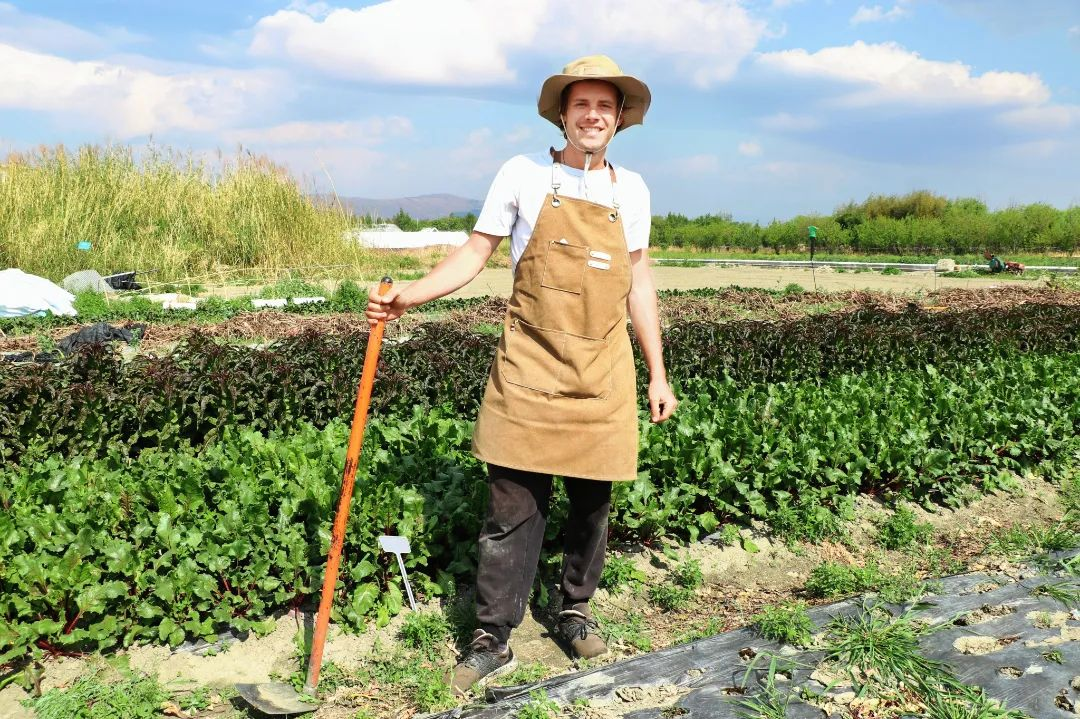Migratory tourism in Yunnan: A treasure trove of delightful surprises
“I’ll head south after I finish harvesting the wheat and go to Xishuangbanna to spend the winter.” Recently, a woman in her sixties from Anyang, Henan, shared these words during a live broadcast. Despite her limited savings, she dreams of riding her tricycle to explore the stunning landscapes of China.
The endearing “Wheat Aunt” has captured the hearts of many, and her journey south has inspired countless individuals. Recently, this touching story took a new turn—thanks to the support of generous online friends, “Wheat Aunt” has successfully reached Xishuangbanna, Yunnan, where she has started a new chapter in her life at a guesthouse.
What makes “migratory tourism in Yunnan” so appealing to so many? The region features unique climatic conditions and diverse ecological environments, housing small-grain coffee and ancient tea trees, along with customs that incorporate flowers, insects, and wild mushrooms into their cuisine, each with its own distinctive characteristics. Yunnan is rich in world heritage sites, cultural cities, traditional villages, and a continually evolving range of new cultural tourism initiatives. The 26 ethnic groups here coexist like one family, each showcasing their unique beauty while fostering harmony. The transition from “tourism” to “migratory tourism” goes beyond mere terminology; it represents a significant transformation in the tourism industry. In this issue, we invite you to discover the poetic allure of Yunnan and immerse yourself in life in this vibrant region.

Tourists have leisure in Kunming.
Kunming: Harmonizing a leisurely lifestyle with entrepreneurial aspirations
Cui Yang, a 35-year-old software development engineer, has been residing in Kunming for eight months now. He said, “Life here is very relaxed, and I feel like things have slowed down.” With a monthly rent of 2,500 yuan, he enjoys exploring the market filled with a variety of wild vegetables, many of which he cannot name. The city boasts uniquely styled cafes tucked away in old alleys, snacks rich in ethnic flavors, charmingly designed small urban parks, and abundant greenery. After resigning from an internet company in Beijing at the end of last year, Cui Yang moved to Kunming to embrace a mobile working lifestyle.
“The energy generated by an individual and their computer can quickly amplify through the internet. The fundamental quality of skill monetization in freelancing enables people to eliminate numerous cumbersome external factors and earn income based on their personal abilities.” Leveraging his expertise in software development and we-media, Cui Yang has successfully achieved a commendable income through his mobile working setup.
With its spring-like climate year-round, convenient transportation, excellent medical and educational standards, and rich cultural heritage, Kunming is undoubtedly an ideal destination for freelancers. Many young individuals here opt for mobile work, allowing them to break free from the constraints of a traditional office. By utilizing digital technologies and the internet, they embrace a “hexagonal” lifestyle that enables them to travel, learn, work, socialize, and start businesses all at the same time.
Twenty-five-year-old Li Siyang is one of those individuals. She works for a small enterprise focused on outdoor sports tourism, where she is responsible for planning travel itineraries, organizing related activities, and managing social media. “I really enjoy rock climbing, and this job aligns perfectly with my passions,” she said. Every weekend, Li ventures outdoors with friends to explore the areas around Kunming and Dali. As a blogger with over 10,000 followers on social media, she creates VLOGs during these outdoor activities to promote products. “There are actually many sources of income—promoting and selling outdoor products, planning travel itineraries, marketing travel destinations... By experimenting with various activities, you can always find your own niche,” she explained.
Last year, Yunnan’s first community for digital nomads — the BCC Longshan Digital Nomad Center — was opened in Anning City as part of the city’s “beautiful countryside creation” initiative. Since its establishment, the center has drawn nearly a hundred digital nomads from more than ten countries, including Pakistan, Russia, and the United States, as well as from major cities across China. For these individuals, the countryside provides an ideal setting for both remote work and migratory tourism.
As an increasing number of entrepreneurs choose to settle in rural areas, this trend not only fosters the rejuvenation of rural communities but also represents a departure from traditional talent relocation methods. Many of these individuals are highly skilled professionals, including tech workers, artists, and entrepreneurs, who bring valuable connections to capital, technology, and market resources. This influx of talent has the potential to create new development opportunities for the countryside.

A leisure life in Lijiang
Lijiang: Embracing life as poetry
Last autumn, Chen Zhiye rented a piece of land in a quaint village near Baisha Ancient Town in Lijiang, transforming it into a charming garden café. Each morning, his favorite ritual is to rise early and capture the breathtaking sunrise over the Yulong Snow Mountain.
Chen’s connection with Lijiang began seven years ago during a trip. The ancient town, the snow-capped mountain, crystal-clear waters, and vibrant ethnic culture left a lasting impression on him. In September of last year, he drove solo to Lijiang, a place he had always yearned for, and made the decision to stay.
Chen’s café is located less than two kilometers from Baisha Ancient Town, with a breathtaking view of the majestic Yulong Snow Mountain just a glance away. He decorated the café to reflect his personal style, filling the space with a variety of flowers and plants, and even handcrafting the café's utensils from raw wood. Chen cherishes his days by savoring coffee around a bonfire, tending to the blooming garden, and warmly welcoming guests from near and far. Occasionally, he delights in preparing Canton-style rice rolls for his visitors, offering them a taste of Lijiang’s slow-paced lifestyle alongside delicious cuisine.
As winter approached, Chen rented the farmland in front of the café, envisioning it as an “idyllic farm.” He plowed the land and sowed seeds with the intention of growing vegetables and raising pigs, cows, and sheep. His goal was to create a space where visitors weary of the city’s hustle and bustle could reconnect with nature and relish the joys of rural life.
In contrast to Chen, artist Gu Yuan arrived in Lijiang six years ago and began his journey of creative living in Yuhua Village, located at the foot of Yulong Snow Mountain. In 2021, he organized the cross-boundary arts exhibition “RE: MAKE,” which introduced a contemporary paradigm of crossover art.
“When I first encountered Lijiang, I was filled with a profound sense of awe and limitless inspiration that nature sparked within me,” Gu said. The breathtaking landscapes and rich ethnic culture of Lijiang became a deep well of creative inspiration for him. He tapped into Naxi mythology for his artistic material, explored theatrical concepts through folk embroidery craftsmanship and cultural activities, and created a series of innovative works.
Gu Yuan remarked that Lijiang is a place that nurtures artists. The region’s rich flora and fauna, mild climate, and leisurely pace of life create an inviting atmosphere for artistic creation. He hopes to convey ethnic culture to diverse audiences through his art.
Tuguachong Village: Traditional homes with migratory dwellers
As the morning light bathes Tuguachong Village in Tongquan Subdistrict, Malong District, Qujing City, Yunnan Province, long-stay traveler Liu Chuan’s pastoral life begins to unfold, accompanied by a cup of tea and the comforting scent of books. This retired teacher from Luzhou, Sichuan, decided to settle here after discovering the village's enchanting landscapes on a short video platform.
Tuguachong, a village that once relied mainly on traditional crop cultivation, had fallen into silence as old houses stood idle and land went underutilized. However, the village has since been revitalized, with abandoned farmland being restored and old earthen houses being refurbished. New businesses, such as homestays and tea spaces, have emerged, flourishing like mushrooms after a rain.
Liu often takes leisurely walks and engages in conversations with “neighbors” from various places. Tourists visiting for day trips, weekend getaways, and study tours continuously come and go. “The transformation of Tuguachong relies on everyone’s efforts,” he notes. During the renovation and development process, government departments have primarily focused on improving public infrastructure, including road enhancements, sewage collection and treatment, and the overall living environment within the village. The community has collectively leased 77 idle old houses from farmers for repair, reinforcement, and external renovation. They have also converted underutilized land into thriving green spaces, planting chrysanthemums and hydrangeas, and created camping areas along with open-air movie screenings tailored to the local context.
Yunnan Ruogu Cultural Tourism Development Co., Ltd. is in charge of renovating the houses, sourcing furniture, and managing operations, as well as introducing businesses to develop homestays and countryside bars, among other services. “We’re not just renting out a few houses and making some basic renovations; attracting and retaining guests really depends on the quality of our offerings and services,” stated the company’s chairman, Zhong Peng. They operate under a “store assistant” model, providing package collection, essential goods purchasing services, and establishing visitor assistance stations and convenient medical stations. In response to community needs, they have set up convenient stalls, small gardens, and urban-rural bus stops. Additionally, they founded Ruogu Bookstore, introduced village art museums and rock painting studios, and organized rural concerts and tea gatherings, enriching the cultural and recreational life of the villagers.
In the early morning at Tuguachong Village, tourists gather in a courtyard with yellow walls and gray tiles to brew tea, their laughter and cheerful voices filling the air. Young children on autumn outings form long lines, animatedly chatting with one another. Yang Fuheng, a teacher from the School of Fine Arts at Qujing Normal University, leads his students in sketching, as they endeavor to capture the village’s stunning scenery on paper.
Sixty-eight-year-old villager Li Qiaoxiang chats with her neighbors while deftly trimming excess bean shoots with scissors. In her view, the village is alive with tourists, as vehicles come and go in steady flow. She reflects on how Tuguachong Village has experienced a remarkable transformation in just a few short years.
At “Sister Ling’s Variety Store,” which opened last October, staff member Liu Ruifen from Wangjiazhuang Village is hard at work. The two villages, Wangjiazhuang and Tuguachong, are only a half-hour’s drive apart. “The atmosphere here is wonderful, and I can earn 4,000 yuan a month. I hope our village can thrive too,” Liu said, her words reflecting hope and anticipation.

Patrik from Sweden grows crops in Dali.
Dali: “I am a local, not a foreigner”
In Dali, Yunnan, nearly 100,000 “new residents” have made this place their home, including a number of international friends.
“In Dali, I am a local, not a foreigner,” said Patrik from Sweden, who settled in Dali six years ago and has long since integrated into the local community. He and many other new Dali residents describe their experience with phrases like, “It feels like home” and “I belong here.”
Patrik has loved nature since childhood, cherishing unforgettable memories of the great outdoors. “The mountains and waters of Dali are beautiful in every season,” he stated. “The landscape here is stunning, and the weather is excellent, which is why we decided to make this place our home.”
“Full-time parenting and part-time farming” is how Patrik describes himself on his social media account. He cultivates organic vegetables on a farm and engages with netizens during live broadcasts, answering questions about organic farming whenever he can. From initially not understanding Chinese to now communicating fluently in Mandarin, Patrik has gradually immersed himself in the vibrant city of Dali.
In addition to farming daily, Patrik uses his spare time to expand his agricultural knowledge. He said, “I hope that in the future, more young people come to understand and appreciate agriculture. Nature is our great mother, and by working alongside her, we can lead healthier lives and improve our quality of life.”
Linden from the United States met friends from all over the world while operating a homestay in Dali Xizhou, sharing the local culture of Dali. He first came to China in 1984 to study Chinese language and culture in Beijing. He was deeply impressed by China’s customs and culture, especially having a special affection for rural China, which he calls “home.” In 2004, Linden returned to China with his wife and two sons, hoping to find a traditional old house to renovate and protect as a cultural exchange base between China and foreign countries. With this goal in mind, the family traveled around China for two years before settling in Xizhou, Dali, Yunnan.
Linden explained that he chose Xizhou for three reasons: first, the presence of valuable old houses that require restoration; second, the warmth and inclusiveness of the local people; and third, the support from the local government for their vision. The Linden Center, his homestay, embodies the principle of “preserving the old as old” and is founded on a Bai residence, “Yang Pinxiang’s Courtyard.” This design maximizes the preservation of Bai architectural style by maintaining the traditional layout of “3-room units and a screen wall,” while also showcasing exquisite wood carvings and beautifully preserved murals.
An American running a homestay in rural China works as the best advertisement for The Linden Center. Since its opening, foreign visitors have come in waves, using The Linden Center as a base to explore the surrounding villages. One of the unique features of The Linden Center is its cultural experience activities. Linden enjoys taking travelers on strolls through the morning market of Xizhou Ancient Town, introducing them to the Bai people’s tradition of three cups of tea, and guiding them in creating handmade tie-dye art.
The viewing platform at The Linden Center offers a stunning view of the pastoral landscape of Xizhou. Linden believes that the world must strive to better understand an open China. “The cultural spirit of China has become a part of me; it is China that has nurtured and shaped who I am,” Linden said. “We will continue to work diligently to share the story of China with the world.”
Text by our staff correspondents
Translated by YNTA